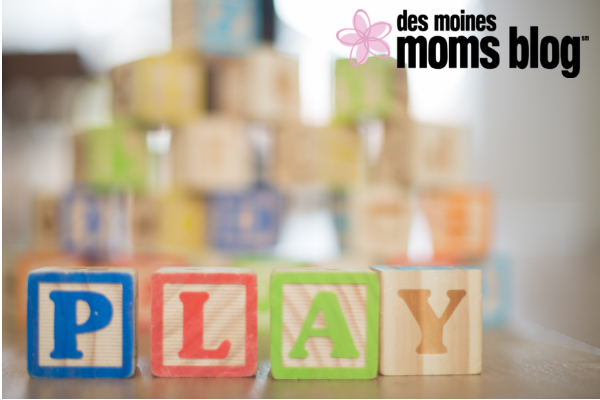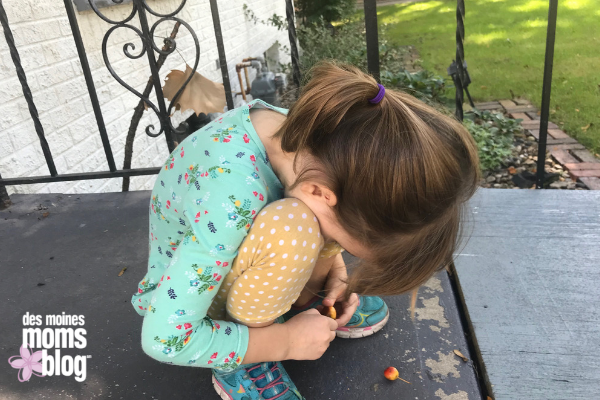Yesterday I was sitting with my four-year-old Nora on our front steps. Sunny with a cool breeze, it was an idyllic early fall afternoon. I sipped my coffee and watched her step onto our crab apple-covered-driveway. Our tree had just begun dropping its ornamental fruit as it does every fall. I normally regard it as a nuisance.
Nora, however, regarded this as her annual, early fall invitation to play.
Thirty seconds later, she rejoined me on the steps with two crab apples, one red and one gold whom she’d named “Nora” and “Mommy”.
I silently observed as she immersed herself into a world of play. I felt like an eavesdropper, listening in on a private conversation between the crab apple versions of Nora and myself:
“You want to eat rice for lunch, Nora? Ok! You can come in the kitchen and help me measure!”
“Oh thanks, Mommy! Then after we eat, you can take me to my class. I have to teach ballet today…”
When I am on the outside looking in on my daughter’s play, I am enchanted. Utterly mesmerized. I get the distinct impression that I am witnessing something rare in these moments.
The more I chase this curiosity, the more I am learning that professionals in the field of child development have growing concerns that regular independent play IS a rarity in today’s children.
In an article published by the Washington Post, mental health professional, Lena Aburdene Derhally writes:
“Because we have become such a work- and -results driven society, free, unscheduled play for children has taken a backseat. In fact, since 1955, free play has been declining. This lack of play effects emotional development and is thought to be leading the rise of anxiety, depression, and other mental disorders in children.”
Fellow mamas, I don’t know about you, but when I think about this trend, I find myself on the verge of guilt. I often think about my two older children who have NEVER been as playful as their little sister. I ask myself: Have I allowed them too much screen time? Have my choices hindered them from experiencing quality play? Is it too late for them to experience the benefits of free play?
It does not do to dwell on these thoughts, though, am I right? I have become convinced that while play might be a lost art, it certainly is not a lost cause!
There are lots of resources available to help parents encourage their kids to immerse themselves in playing!
- Learn more about the importance of childhood play and its different forms and stages, at Encourage Play.
- Go to the Des Moines Children’s Museum with your kids for meaningful play opportunities.
- Let your kids’ imaginations run wild at one of our local Natural Playscapes.
- Find the “Play” section at the Mr. Printables website for some delightful (FREE!) printable toys which your kids are sure to love.
Finally, I want to share an upcoming opportunity for Des Moines families, hosted by a local mom and advocate for children with learning differences, Ruth Stieff. Ruth owns One Piece, LLC. She is passionate about encouraging, helping, and training kids with learning differences as well as their families. Ruth’s growing interest in early childhood play has prompted her to offer a series of parent-child play dates, free of charge, this fall.
Parent-Child Play Dates
These play dates are open to children up to age 3 and their parent or caregiver will take place at the Valley Community Center in West Des Moines 10 am. to 10:30 a.m. October 2, 16, 30, and November 13. While you interact with your child, Ruth will guide you through an exploration of the importance of play, types of play, and the development of play.
Are you interested in this opportunity but can’t make it to any of the scheduled playdates? Ruth will be glad to hear from you at [email protected] and see if she can work something out with you!


















